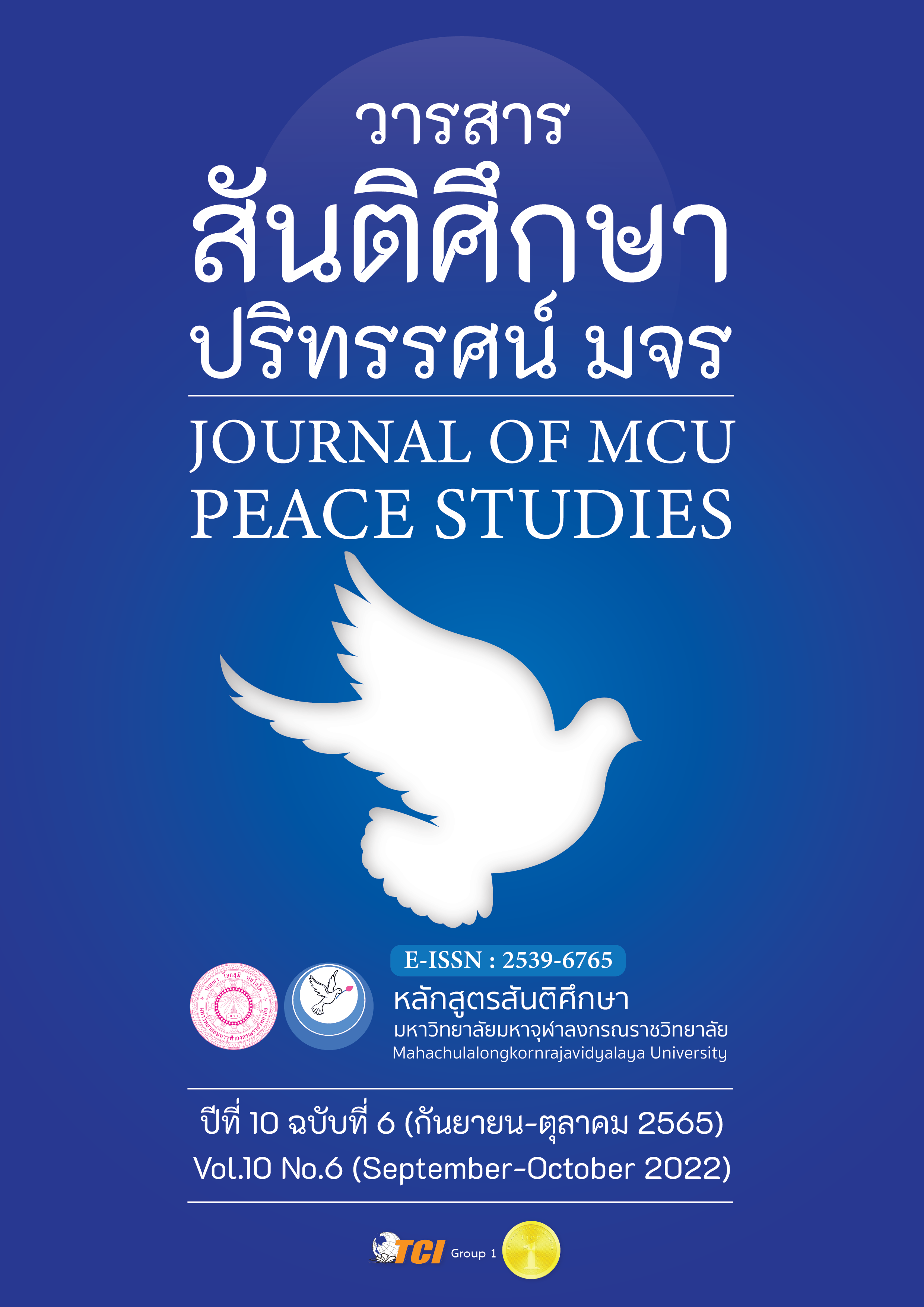ความสำเร็จของผู้ประกอบการธุรกิจสมุนไพรไทย ภายใต้แนวคิดเศรษฐกิจสร้างสรรค์และนวัตกรรมผลิตภัณฑ์
Main Article Content
บทคัดย่อ
ปัจจุบันสมุนไพรมีศักยภาพในการที่จะขับเคลื่อนเศรษฐกิจ และสามารถสร้างความยั่งยืนให้กับระบบเศรษฐกิจและสังคมต่อไปในอนาคต ทั้งนี้ตลาดการบริโภคสมุนไพรมีอัตราการขยายตัวที่มากที่สุดทั้งในระดับประเทศ และในระดับโลก หากผู้ประกอบการสามารถนำแนวคิดเศรษฐกิจสร้างสรรค์ และนวัตกรรมผลิตภัณฑ์ไปใช้ในการดำเนินธุรกิจ จะทำให้ผู้ประกอบการสามารถเพิ่มผลิตภาพผลิตภัณฑ์สมุนไพรไทย สร้างความสำเร็จของธุรกิจให้กับผู้ประกอบการผลิตภัณฑ์สมุนไพรไทยได้ดียิ่งขึ้น บทความนี้นี้มีวัตถุประสงค์เพื่อศึกษาอิทธิพลของความเป็นผู้ประกอบการ แนวคิดเศรษฐกิจสร้างสรรค์ และนวัตกรรมผลิตภัณฑ์ต่อความสำเร็จของธุรกิจสมุนไพรไทย เป็นการวิจัยเชิงปริมาณกลุ่มตัวอย่าง จำนวน 360 ราย ได้แก่ ผู้ประกอบกิจการวิสาหกิจชุมชน/เครือข่ายวิสาหกิจชุมชนกลุ่มการผลิตสมุนไพร เก็บรวบรวมข้อมูลโดยใช้แบบสอบถาม มีค่าความเชื่อมั่นระหว่าง 0.937-0.966 วิเคราะห์ข้อมูลโดยการวิเคราะห์การถดถอยพหุคูณ
ผลการวิจัย พบว่า 1) ความเป็นผู้ประกอบการด้านความมีนวัตกรรม และด้านความมุ่งมั่นในการแข่งขันมีอิทธิพลต่อความสำเร็จของธุรกิจสมุนไพรไทยอย่างมีนัยสำคัญทางสถิติ ซึ่งความผันแปรของความสำเร็จได้รับอิทธิพลจากความเป็นผู้ประกอบการ ร้อยละ 56.7 2) แนวคิดเศรษฐกิจสร้างสรรค์ด้านการใช้องค์ความรู้ ด้านการสร้างสรรค์งาน และด้านการใช้เทคโนโลยี และนวัตกรรมมีอิทธิพลต่อความสำเร็จของธุรกิจสมุนไพรไทยอย่างมีนัยสำคัญทางสถิติ ซึ่งความผันแปรของความสำเร็จได้รับอิทธิพลจากแนวคิดเศรษฐกิจสร้างสรรค์ ร้อยละ 66.0 และ 3) นวัตกรรมผลิตภัณฑ์ด้านการพัฒนาและแนะนำผลิตภัณฑ์ใหม่สู่ตลาด ด้านการปรับปรุงคุณภาพของผลิตภัณฑ์อย่างต่อเนื่อง และด้านเอกลักษณ์เฉพาะของผลิตภัณฑ์มีอิทธิพลต่อความสำเร็จของธุรกิจสมุนไพรไทยอย่างมีนัยสำคัญทางสถิติ ซึ่งความผันแปรของความสำเร็จได้รับอิทธิพลจากนวัตกรรมผลิตภัณฑ์ ร้อยละ 56.7
Article Details

อนุญาตภายใต้เงื่อนไข Creative Commons Attribution-NonCommercial-NoDerivatives 4.0 International License.
ทัศนะและความคิดเห็นที่ปรากฏในบทความในวารสาร ถือเป็นความรับผิดชอบของผู้เขียนบทความนั้น และไม่ถือเป็นทัศนะและความรับผิดชอบของกองบรรณาธิการ ยินยอมว่าบทความเป็นลิขสิทธิ์ของวารสาร
เอกสารอ้างอิง
Boonyoo, T. (2018). Mediation Effect Innovation in Transferring Effects of Organizational Culture, Market Orientation, Knowledge Management and Entrepreneurship to Sustainable Competitive Advantage of Footwear and Leather Goods Industry. Ph.D. in Social Sciences Journal, 8(Special Edition), 45-62.
Cochran, W. G. (1963). Sampling Techniques (2nd ed.). New York: John Wiley and Sons.
Department of Agricultural Extension. (2020). Report on the Type of Community Enterprise that Has Been Approved for Registration, Classified by Area. Retrieved August 1, 2020, from http://smce.doae.go.th/smce1/report/report_smce_type.php?type_smce=1&levelSearch=1®ion=&province=&hur=&typeDate=2&date_start=&date_end=01/08/2563.
Donkwa, K. (2016). A Model of Factors in Creative Economics and Innovative Behavior Affecting the Long-Run AEC Strategies of Thailand. Management Technology, Institute of Social Technology, Suranaree University of Technology.
Hassan, M., Shaukat, S., Saqib, M., & Naz, S. (2013). Effects of Innovation Types on Firm Performance: An Empirical Study on Pakistan's Manufacturing Sector. Pakistan Journal of Commerce and Social Sciences, 7(2), 243-262.
Jiraphanumes, K., Aujirapongpan, S., & Chamchang, P. (2011). The Effect of Entrepreneurial and Strategic Orientation on Innovativeness and Performance: The Empirical Study of the Listed Companies in the Market for Alternative Investment (MAI). Journal of Management Sciences, 28(1), 1-15.
Karabulut, A. T. (2015). Effects of Innovation Types on Performance of Manufacturing Firms in Turkey. Procedia - Social and Behavioral Sciences, 195, 1355-1364.
Laistrooglai, A. (2009). Creative Economy Mapping: New Economic System. Brand Age Essential, 3, 22-23.
Ministry of Public Health and Public-Private Organizations. (2016). National Master Plan for Thai Herbs Development No. 1 (2017-2021). Nonthaburi: Department of Thai Traditional and Alternative Medicine, Ministry of Public Health.
Na Ayudhaya, S.K. (2010). Creative Economy: A New Alternative to Develop the Thai Economy. Bangkok: Bangkok University.
Na Ubon, A. (2016). The Development of Guidelines for Promoting Open Innovation in the Innovation Processes of Software Industry in Thailand. Bangkok: Dhurakij Pundit University.
Namwong, V. et al. (2019). Entrepreneurial Orientation of Retail Business Owners Participating in the Blue Flag Project in the Upper Northern Region of Thailand. Business Administration Journal, Maejo University, 1(1), 48-59.
Sawangrat, N. (2015). Structural Effects of Entrepreneurship Market Orientation, Innovation Orientation and Learning Orientation on the Firm Performance. Veridian E-Journal Silpakorn University: Humanities, Social Sciences, and Arts, 8(3), 958-975.
Silpjaru, T. (2014). Statistical Research and Analysis with SPSS and AMOS. (15th Edition). Bangkok: S. R. Printing Massproducts.
Vanichbuncha, K. (2013). Statistical Analysis: for Administration and Research. (14th Ed.). Bangkok: Statistics, Faculty of Commerce and Accountancy, Chulalongkorn University.


